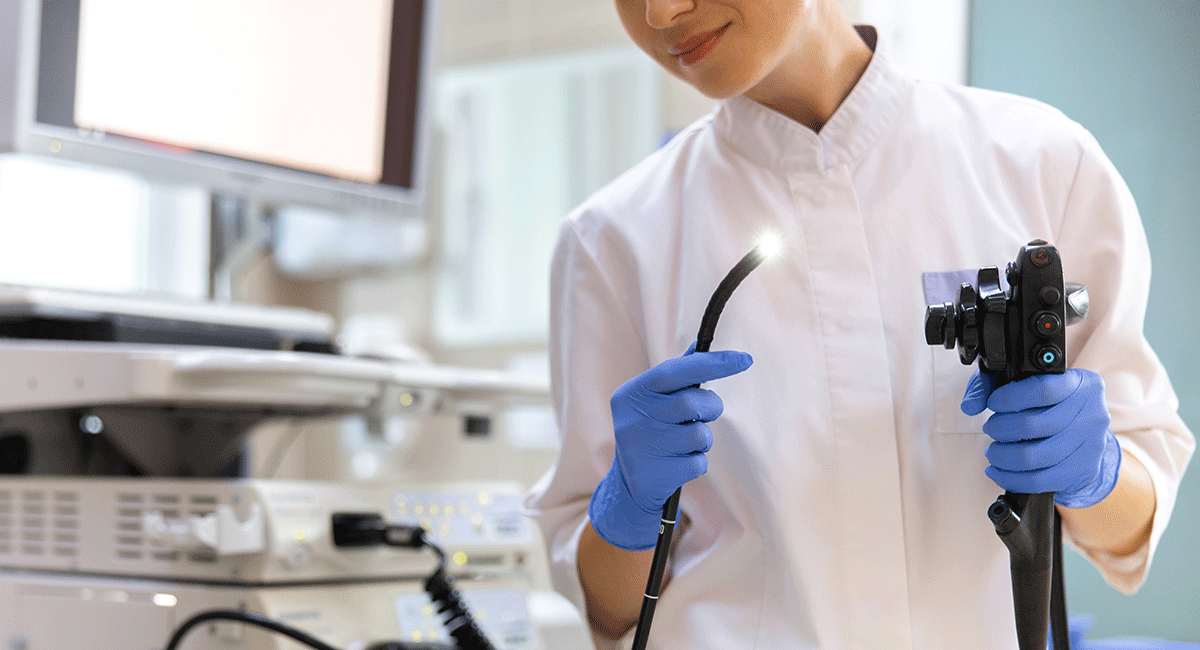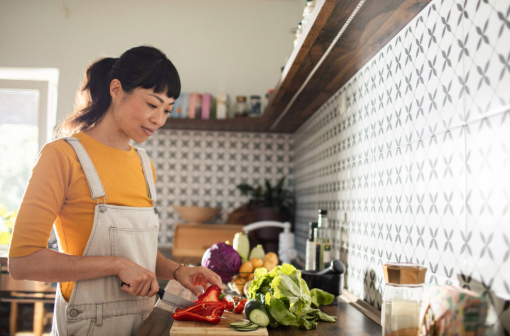“For anyone with symptoms like heartburn, nausea, or abdominal pain, an endoscopy allows a specialist to look at the upper part of your digestive tract.” —Kate Pyke, Health Coach
Key points
- A gastrointestinal endoscopy, or endoscopy for short, is a common medical procedure.
- It allows a doctor to observe the inside of your body without performing major surgery.
- It is one way to observe and diagnose the symptoms of disorders, such as Irritable Bowel Syndrome.
If you are experiencing problems with your digestive system, or if your doctor thinks you may have a digestive condition, then you may hear the procedure “gastrointestinal endoscopy” as one of the ways to take a closer look at what is going on. And naturally, you probably have some questions.
Put simply, an endoscopy allows a doctor to observe the inside of your body without performing major surgery. They insert a long flexible tube with a lens at one end and a video camera at the other, this is called an endoscope. Remember this, as this tool will be referred to regularly.

When is a gastrointestinal endoscopy required?
A gastrointestinal endoscopy is one of the key methods for observing and diagnosing the symptoms of gastrointestinal disorders, such as Irritable Bowel Syndrome. This procedure allows doctors to examine the lining of the digestive tract using the endoscope, which can help identify abnormalities, rule out conditions, and guide treatment decisions.
“For anyone with symptoms like heartburn, nausea, or abdominal pain, an endoscopy allows a specialist to look at the upper part of your digestive tract,” says Kate Pyke, a Health Coach with Australian Unity’s healthcare partner, Remedy Healthcare.
“It looks at your oesophagus, your stomach and your duodenum—which is the part at the top of your small intestine, connecting the small intestine to the stomach—and is used to visually investigate inflammation, tumours, or ulcers. The specialist can visually see them on the camera, and they can even treat certain conditions like a bleeding blood vessel or polyps, then and there.”
Thankfully, an endoscopy is normally a day procedure, taking no more than 15 to 30 minutes to complete (plus observation), with pain managed by a local anaesthetic and a slight sedative to help you relax.
Kate says the procedure is not necessarily painful, but likely to be slightly uncomfortable. With a small amount of preparation required in the hours prior to the procedure.
“Some clients may have a slightly sore throat or some bloating in the stomach from introduction of air into the digestive system, but it's not long lasting,” Kate assures.
“It is a fasted procedure. Six hours prior to your endoscopy you need to stop having food and liquid, but there's no need to clear out the bowel. Make sure you let your doctor know what medications you're on, because some of the doses do need to be adjusted for the endoscopy.”
What is Irritable Bowel Syndrome?
According to Dietitians Australia, Irritable Bowel Syndrome (IBS) is a common gastrointestinal disorder affecting the intestine. It is characterised by symptoms like abdominal pain, bloating, gas, diarrhoea and constipation. While the exact cause of IBS is unknown, it is believed to be triggered by a combination of factors such as stress, infection, food poisoning and medication.
“Irritable bowel syndrome manifests differently in different people for a range of different reasons, it's more a diagnosis to describe a digestive disorder caused by two common groups of symptoms,” explains Kate.
The first group is digestive symptoms, including abdominal pain, cramping, diarrhoea, or constipation. The second group is non-digestive symptoms, which can be anxiety, depression, fatigue, poor sleep, headaches and often muscle aches.
“IBS is never an initial diagnosis and there's no test that confirms the syndrome,” Kate adds. “It is often diagnosed when other digestive disorders—like celiac disease, inflammatory bowel disease, ulcerative colitis, Crohn's disease, endometriosis, bowel cancer—are ruled out due to testing.”
“To diagnose IBS a doctor will first rule out other disorders, then undertake long-term diagnosis or observation based on the symptoms you’ve experienced, foods you’ve consumed, and measures taken to alleviate the symptoms. This is known as the Rome criteria.”

Maximising your gut health
So what can we do to reduce the likelihood of a gastrointestinal disorder or to alleviate the symptoms of IBS you may be experiencing? Kate falls back on four trusted pillars for gut health: a healthy diet, exercise, stress management and sleep.
- Healthy Diet – Aim for 30 different plants per week—this includes fruits, vegetables, wholegrains, nuts, seeds, legumes and herbs—and ensure enough fibre and probiotic foods.
- Exercise – Complete a mixture of strength and cardio workouts throughout the week, aiming for ~30 minutes activity daily.
- Stress Management – Try to include walking, meditation or reading—anything that slows you down to become mindful—into your daily routine, do not overload your schedule and try to allocate sufficient recovery time between big projects.
- Sleep – Aim for between 7 and 9 hours sleep each night. Sleep helps with reducing stress, physiologically helping us choose more nutritious foods and allows the body to recover.
For Kate, sleep and stress management are keys that are often overlooked for gut health.
“Sleep in general is going to help to reduce stress, which is going to help you achieve those other pillars,” she notes. “Physiologically, having a good sleep pattern actually helps us to choose more nutritious foods, and when we've had better sleep it allows your body to recover.”
So, no matter what symptoms or condition has resulted in you being scheduled in for a gastrointestinal endoscopy, it’s important to note that the procedure is likely to be a touch uncomfortable, rather than painful or complicated.
If a healthy gut is the foundation to a healthy life, by sticking to Kate’s tips of a healthy diet and a healthy sleep pattern, you can ensure that future photos and videos taken of you are of your outside, not inside!
Want to discuss your health cover, or to lock in your current rate? Talk to us today.
Disclaimer:
Information provided in this article is of a general nature. Australian Unity accepts no responsibility for the accuracy of any of the opinions, advice, representations or information contained in this publication. Readers should rely on their own advice and enquiries in making decisions affecting their own health, wellbeing or interest. Interviewee names and titles were accurate at the time of writing.


